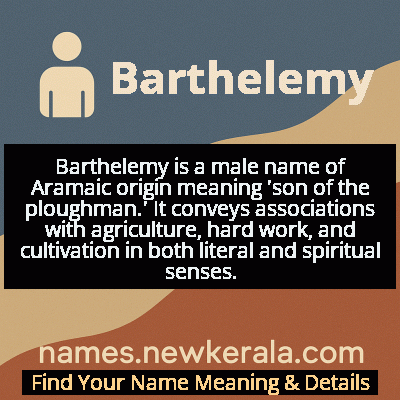Barthelemy Name Meaning & Details
Origin, Popularity, Numerology Analysis & Name Meaning of Barthelemy
Discover the origin, meaning, and cultural significance of the name BARTHELEMY. Delve into its historical roots and explore the lasting impact it has had on communities and traditions.
Name
Barthelemy
Gender
Male
Origin
Aramaic
Lucky Number
1
Meaning of the Name - Barthelemy
Barthelemy is a male name of Aramaic origin meaning 'son of the ploughman.' It conveys associations with agriculture, hard work, and cultivation in both literal and spiritual senses.
Barthelemy - Complete Numerology Analysis
Your Numerology Number
Based on Pythagorean Numerology System
Ruling Planet
Sun
Positive Nature
Leaders, ambitious, highly driven, self-reliant, innovative.
Negative Traits
Overly aggressive, domineering, impatient, selfish.
Lucky Colours
Red, orange, gold.
Lucky Days
Sunday.
Lucky Stones
Ruby, garnet.
Harmony Numbers
2, 3, 9.
Best Suited Professions
Entrepreneurs, managers, engineers.
What People Like About You
Courage, determination, leadership.
Famous People Named Barthelemy
Barthélemy de Laffemas
Economist
French economist and early mercantilist who served as controller-general of commerce under Henry IV
Barthélemy Catherine Joubert
Military General
French general during the Revolutionary Wars who commanded the Army of Italy
Barthélemy Boganda
Politician
First prime minister of the Central African Republic autonomous territory and national independence hero
Barthélemy Thimonnier
Inventor
French inventor who created the first sewing machine that replicated hand sewing
Name Variations & International Equivalents
Click on blue names to explore their detailed meanings. Gray names with will be available soon.
Cultural & Historical Significance
In contemporary contexts, Barthelemy maintains its cultural weight as a name that signals both tradition and sophistication. It appears frequently in French literature and historical records, often associated with characters or real individuals of substance and integrity. The name's persistence through centuries demonstrates its enduring appeal and the cultural values it represents: reliability, intellectual depth, and respect for heritage. In French-speaking regions outside Europe, such as Quebec and parts of Africa, the name serves as a cultural marker connecting diaspora communities to their French linguistic and religious roots while adapting to local contexts.
Extended Personality Analysis
Individuals named Barthelemy typically exhibit personality traits reflecting the name's agricultural origins and historical gravitas. They tend to be methodical, patient, and deeply grounded—characteristics reminiscent of the ploughman who works steadily toward long-term goals. Barthelemys often demonstrate remarkable persistence and attention to detail, approaching challenges with systematic thinking and practical solutions. Their strong connection to tradition frequently manifests as loyalty to family, respect for institutions, and appreciation for historical continuity. While sometimes perceived as reserved or conservative, this often masks a rich inner life and careful observation of their surroundings.
Beyond their practical nature, Barthelemys frequently possess intellectual depth and quiet confidence. They tend to be thoughtful communicators who prefer substance over superficiality, making them valued advisors and trusted friends. Their agricultural heritage symbolism translates into a nurturing disposition—they often excel at cultivating relationships, ideas, or projects to fruition. While not typically flashy or attention-seeking, Barthelemys command respect through their competence, reliability, and integrity. They balance their traditional values with adaptability when necessary, demonstrating that the steadiness of the ploughman can navigate changing seasons while maintaining core principles and purpose.
Modern Usage & Popularity
In modern times, Barthelemy occupies a distinctive niche as a traditional name that conveys sophistication and heritage without being overly common. Its usage remains strongest in France and French-speaking regions like Quebec, Belgium, and Switzerland, where it maintains steady though modest popularity outside the top name rankings. The name has experienced a slight resurgence as part of the broader trend toward vintage and meaningful names, appealing to parents seeking alternatives to more popular biblical names while maintaining religious and cultural connections. Contemporary usage often involves the affectionate shortening to 'Bart' or 'Barth' in informal settings, though many bearers and their families prefer the full name for its elegant, complete sound. The name's relative rarity in English-speaking countries adds to its distinctive appeal for parents seeking internationally recognizable yet uncommon names. Modern Barthelemys often find their name serves as a conversation starter and connection point to French culture and history.
Symbolic & Spiritual Meanings
Symbolically, Barthelemy represents the profound connection between human labor and spiritual growth. The ploughman imagery evokes the essential human activity of preparing the earth for sustenance, symbolizing how foundational work—whether physical, intellectual, or emotional—creates the conditions for future abundance. This extends metaphorically to the cultivation of character, knowledge, and relationships, suggesting that meaningful achievement requires patient preparation and consistent effort. The name also carries symbolism of bridging worlds: connecting heaven and earth through its apostolic associations, joining past and present through its historical continuity, and uniting humble origins with elevated purpose. Barthelemy symbolizes the idea that true value emerges from rootedness—whether in soil, tradition, or principle—and that the most reliable growth comes from steady, deliberate cultivation rather than rapid but fragile advancement. The name ultimately represents the dignity of purposeful work and the wisdom that comes from understanding natural cycles and human nature.

